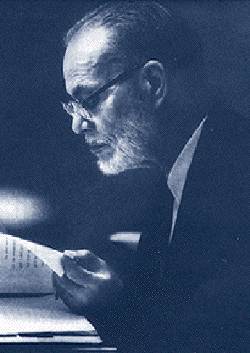 By Yasser Latif Hamdani
By Yasser Latif Hamdani
Last week (February 6) marked the 114th Birthday of one of Pakistan’s greatest unsung heroes. Once again, there was no mention of commemoration of his remarkable like. No sense of gratitude from a nation for which he did so much. He has been wiped out of our memory because he was an Ahmadi, despite his glorious contributions to Pakistan and its cause (see related post on Dr. Abdul Salam).
Sir Zafrullah Khan’s services rendered to Muslims of India, Pakistan and the Third World are second only to that of Quaid-e-Azam Mahomed Ali Jinnah. As a jurist, a diplomat and a patriot he stood head and shoulders above the lesser men who have made a mockery of our republic.
Born in 1893 in Sialkot in what was to become one of the earliest Ahmaddiya households, this small town boy rose to be one of the shrewdest legal minds of his time. His early education was in Sialkot, after which he proceeded to Lahore for his bachelors degree, under the tutelage of none other than the great Iqbal himself. He got his law degree from King’s College London in 1914, where he stood top of his class and was the first person from the Indian subcontinent to do so. He was, like most great figures of that time, called to bar at Lincoln’s Inn.
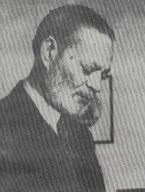
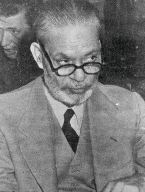
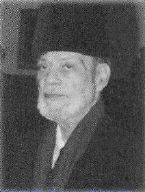


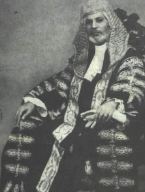
As a practicing lawyer, he soon proved his mettle and had many reported cases to his name. The first major politician to recognize Zafrullah’s talents was Sir Fazli Hussain, the founder of Unionist Party of Punjab. Starting his career in his early 30s as a member of the Punjab legislative Council, he rose to prominence as an indefatigable crusader for Muslims of Punjab. Later he represented the Muslims at round table conference and crossed swords with figures like Jinnah and Gandhi. In 1931, he became the Muslim League president and at the roundtable conference, he cornered no less a person than Churchill in a committee hearing who was forced to accept Zafrullah’s point of view.
Later he was offered a seat on Viceroy’s permanent Council, which he took to further his cause. He also served at varying times as the minister of Railways, Public works, labour and law under the Viceroy. For a brief period, he also became British India’s representative to the League of Nations, just before it was dissolved.
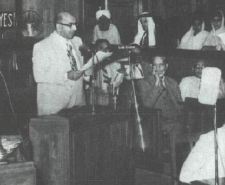
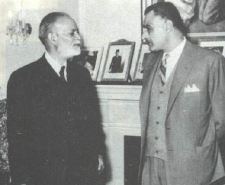
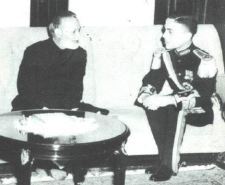
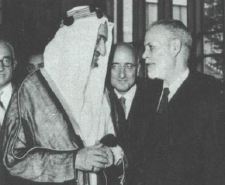
![]()
However his greatest contribution came when he drafted the famous Lahore Resolution, which till this day is the rallying point of Pakistan and Pakistani nationalism. He had been tasked with finding a common point between the popular demand for “Pakistan” and Muslim League’s all India requirements. The Lahore resolution was a broad based solution which left the door virtually open for several solutions and negotiation on the issue of partition. In essence it envisaged 2 or 3 great republics for the Muslim peoples and it was this document which forms the basis not just of Pakistan but also of Bangladesh. For this he got a lot of slack. No less a person than Khan Abdul Wali Khan highlighted Zafrullah’s religious belief to play on the popular conspiracy theory that holds Ahmadis to be British touts.
Later from 1942 onwards, he served as a federal judge (equivalent of an Supreme court C judge) of India and finally took leave on the eve of Pakistan to serve the cause of Pakistan before the Radcliffe Commission, on Jinnah’s personal request. On 25th December 1947, Jinnah appointed him the Foreign Minister of Pakistan. At the UN, Sir Zafrullah emerged as the most eloquent advocate of all third world and Islamic issues. It was Zafrullah whose efforts materialized into the UN Resolutions on Kashmir, which are the basis of the Pakistani case and grievance. Later he became the first Asian president of the International Court of Justice, a singular and unique honor for any Pakistani. He also served, briefly, as the President of the UN General Assembly. He passed away in September of 1983 in Lahore.
A prolific author on the history of Pakistan and Islam, his most famous book was titled “Agony of Pakistan” in which he makes plain the great betrayal which wrested the country from the hands of its patriots into the hands of those who were its greatest enemies. Ironically, today Jinnah’s most trusted lieutenant is not even remembered by the state which owes him so much, including its own founding document. It is the memory of people like Zafrullah Khan that will keep alive the original idea of Pakistan and there is no doubt that one day the posterity will reclaim its true destiny as a progressive and modern republic.
Yasser Latif Hamdani is a lawyer in Lahore and a researcher of the history of the Pakistan Movement.




















































[quote post=”568″]It is the historic evident that Zafarullah Khan happens to be the same person who refused to say the Janaza prayer of Quaid-e-Azam as M A Jinnah was considered non muslim even though he was present at his janaza.[/quote]
Really? Damn! I bet Sir zafarullah must be a Mullah rather than a qadyani because only Mullahs had right to declare kafir others otherwise cabals like seculars,qadyanis are “educated”,”enlighted” and “true muslims”.
I wonder How come our inhouse Pakistani/Jinnah History expert YLH skipped this portion while writing a delated post about Zafarullah Khan?
[quote post=”568″]Why you get angry brother?[/quote]
it’s a kind of secular extreemism :-),if you don’t agree them,you are not required.
Our low & limited mentality always exposed when we called a very respectable but minute & also very influencial portion of our society ‘Mullah’.
People blame them as a source of all evils because they don’t agree with them, & in my view “Disagreement” is not an issue. It is the right of every individual but calling them with any bad or biased name bacause u r not agree with them is also very bad.
It is the historic evident that Zafarullah Khan happens to be the same person who refused to say the Janaza prayer of Quaid-e-Azam as M A Jinnah was considered non muslim even though he was present at his janaza.
Just as Mir Jafar pushed India into the abyss of slavery by betraying Siraj ud Daulah, in the same manner, three treacherous Qadianis have been successful in undoing Pakistan to a great extent. First was Zafarullah Khan who as Pakistan’s advocate before the Radcliffe Boundary Commission lost the link to Kashmir, viz., Gurdaspur, Pathankot, to India, (simultaneously his co-religionist Qadianis were presenting a separate memorandum to the Commission as a separate entity from Muslims) and later as the first Foreign Minister of Pakistan lost the Kashmir case in spite of his tiring and hardly intelligible orations at the United Nations.
I want equal rights for all and freedom of religion for all Pakistanis… this is what Jinnah wanted… this is what Pakistan is based on.
If this is secularism, then I want secularism… if this is Islam, then I want Islam.
Why you get angry brother?I just said who is every where is no where.you want secularism in pakistan?